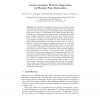Free Online Productivity Tools
i2Speak
i2Symbol
i2OCR
iTex2Img
iWeb2Print
iWeb2Shot
i2Type
iPdf2Split
iPdf2Merge
i2Bopomofo
i2Arabic
i2Style
i2Image
i2PDF
iLatex2Rtf
Sci2ools
ACCV
2010
Springer
2010
Springer
Latent Gaussian Mixture Regression for Human Pose Estimation
Discriminative approaches for human pose estimation model the functional mapping, or conditional distribution, between image features and 3D pose. Learning such multi-modal models in high dimensional spaces, however, is challenging with limited training data; often resulting in over-fitting and poor generalization. To address these issues latent variable models (LVMs) have been introduced. Shared LVMs attempt to learn a coherent, typically non-linear, latent space shared by image features and 3D poses, distribution of data in that latent space, and conditional distributions to and from this latent space to carry out inference. Discovering the shared manifold structure can, in itself, however, be challenging. In addition, shared LVMs models are most often non-parametric, requiring the model representation to be a function of the training set size. We present a parametric framework that addresses these shortcoming. In particular, we learn latent spaces, and distributions within them, for...
| Added | 12 May 2011 |
| Updated | 12 May 2011 |
| Type | Journal |
| Year | 2010 |
| Where | ACCV |
| Authors | Yan Tian, Leonid Sigal, Hernán Badino, Fernando De la Torre, Yong Liu |
Comments (0)

